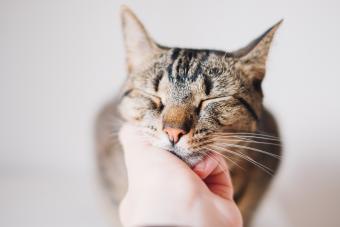
When your cat is stressing, you can feel the nervous energy coming off of them. Many domestic felines are well adjusted, but sometimes you'll find your cat is having a stress attack. If you notice that your kitty is acting anxious or stressed out, then it might be time to take some steps to calm them down.
Determine Why Your Cat Is Stressed

Cats are empathetic, emotional creatures. They respond to their environment, and each cat has a distinct personality. And yes, some are prone to stress. The signs can be very obvious, or more subtle.
- They're hissing or being aggressive. A cat who's feeling stressed out is more likely to be angry and act hostile toward you or other pets.
- Their tail is puffed up or swishing around. Watch your cat's tail. It can indicate they're nervous about something. When your cat swishes their tail low and fast, they're upset about something.
- They're hiding from you. Did your cat disappear when your friends came over? They're probably feeling shy and the presence of guests is stressing them out.
- They're not eating or drinking. If your cat normally eats with gusto, but goes off their food, or stops drinking, you can bet something is bothering them.
- They're stress eating. Watch for signs your cat is going for their food more than normal. This might mean their feeling anxious.
- They're becoming destructive. A cat who is feeling like they don't have any control may take to scratching furniture or ripping stuff up.
- They're looking tense. If your cat's body language is making you think something is wrong, listen. Stressed cats will crouch down, shoot furtive glances around the room, and
- They're suddenly acting skittish. A skittish cat isn't necessarily stressed, but if your normally well-adjusted cat suddenly starts acting skittish, they're likely feeling stress.
- They're meowing like crazy. Cats use their meows to communicate with humans. If your cat is meowing way more than normal, something is going on.
- They're sick or in pain. A cat who isn't feeling well or who has an injury is naturally going to be feeling stressed out. On top of that, cats are naturally stoic, so they're probably hiding the problem.
How to Help Your Kitty Calm Down
The first step in determining the cause of your cat's stress is to consider your own situation. Are you going through a stressful time? Are you having difficulty with work, finances, or relationships? Cats can feel that anxious energy, so addressing your own stress can help. Next, consider how you can help your cat cope with their stress.
1. Figure Out Their Triggers
The key is to watch for changes in your cat's normal behavior. If these occur right after something changed in their environment - if you brought home a new pet, or have been going through a move to a new home - this is very likely what's triggering your cat. Once you remove the trigger, your cat should calm down. If you can't do that so easily, look for other ways to help them deal with the stress.
2. Give Your Cat Some Space
A stressed cat may not be ready to engage with you yet. Letting them escape to a quiet room or part of your home where they feel safe goes a long way to helping them destress.
A cardboard box with a cutout for an entrance could work perfectly as a quick cat hide if you have one lying around!
3. Help with Playtime
Play is an important part of your cat's life. It allows them to use their natural instincts, develop skills, and socialize with other cats. Cats need to learn how to hunt and fight, how to stalk prey and pounce on it. They also need the opportunity to explore and climb, as well as run and leap.
Here are some ways you can play with your cat:
- Foraging games: Hide treats in paper bags or cardboard boxes so your cat has to dig them out. You could even place treats under chairs or behind doors where the kitty must hunt them out.
- Toy box: Give your cat plenty of toys so they have plenty of choices when they want one. A good rule of thumb is three toys per cat plus one more for every year of age, so if you have two cats each should have five toys.
- DIY Fishing pole toy: Attach a string or ribbon to an empty toilet paper roll, then toss it across the room for your kitty.
- Laser pointer: Grab a laser pointer and watch your cat chase it. Be careful not to point it in your cat's or another pet's eyes.
4. Give Them Reassurance

Sometimes, all it takes is a good cuddle and a nice treat. When your cat is ready, see if they want some love and reassurance. Don't force it, though. If they're still at a 10, wait until they come down a bit before you try to pet them or give them treats and praise.
5. Turn the Noise Down
If you suspect loud sounds are triggering your cat, do your best to quiet their environment. This may not be possible if loud sounds are coming from outside, but you can turn music down, and keen noises low around them to help them cope. If your cat is hiding, you can put a towel over their box or carrier to dampen some of the sound, too.
6. Consider Essential Oils
Cats are extremely sensitive to essential oils. So, it is important to know which essential oils are safe for cats and which ones are not. Before using any essential oils on your cat, make sure that you have consulted with your vet about the proper usage and safety. Here are some of the best safe essential oils for cats:
- Lavender oil is one of the most popular essential oils used by cat owners. It has a calming effect on cats and is also useful in managing various health issues, such as anxiety, stress, depression, and insomnia. Use caution with this essential oil and don't forget to review products before purchasing.
- Chamomile oil can be used to treat inflammation and infection in cats. Chamomile oil can also be used as a sedative for cats suffering from nervousness or stress-related disorders. However, ensure that you do not use more than two drops at a time, as it may cause skin irritation in some cases.
- Eucalyptus oil is another safe essential oil for cats that helps fight against respiratory problems such as coughs and colds in felines. Eucalyptus oil can also help reduce swelling and relieve pain caused due to muscle injuries in cats, which may be causing your cat stress.
7. Offer Kitty Companionship

If your cat is lonely, you may want to consider adopting another cat. This is the best solution for most cases of feline loneliness. Cats are social animals that thrive when they have other cats around them for companionship. Even if your cat does not have a friend, adopting another cat can be beneficial because it will give both cats something to do.
You may think that getting another cat would make matters worse, but in fact, it could make them better. If your cat has never had a friend before, they may initially feel threatened by this new creature in their domain. However, once the two cats get used to each other, they will likely enjoy one another's company. If you don't think your cat would like a roommate, maybe do a trial run by having a friend bring their cat over for a play date.
8. Know When to Get Help
If your cat's stress is severe, and their behavior and symptoms are becoming serious, contact your veterinarian to check for underlying medical causes. If your cat is ill or in pain, this is the best way to deal with it. Once your veterinarian has cleared your cat of medical issues, you can contact a behaviorist to assist with getting your cat back to normal. In the meantime, trying the steps above could dramatically reduce your cat's stress levels.
Help Your Cat Back to Calm
It's upsetting to see your kitty go through this. But there's a lot you can do. Keep giving them love, and help them destress on their own terms. Remember, you can't force them to relax. You have to work with your cat to make a difference. But once you have your cat figured out, you'll both feel better and be able to get back to your normal, happy routine.







